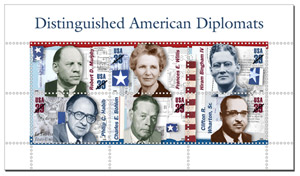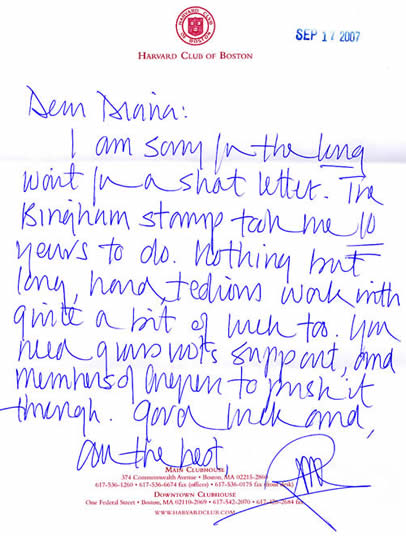

![]()
Congressman Rob Simmons worked for 10 years to bring the Hiram Bingham stamp, part of this 2006 series, to issuance. His message to Diana Mara Henry follows.

SIX DISTINGUISHED DIPLOMATS HONORED ON U.S. POSTAGE STAMPS
Distinguished American Diplomats
WASHINGTON - Six U.S. diplomats-Hiram Bingham IV, Charles E. Bohlen, Philip C. Habib, Robert D. Murphy, Clifton R. Wharton, Sr., and Frances E. Willis-were commemorated on U.S. postage stamps today for their contributions to international relations as negotiators, administrators, trailblazers, shapers of policy, peacemakers and humanitarians.
The "Distinguished American Diplomats" commemorative postage stamps dedication ceremony took center stage during the Washington 2006 World Philatelic Exhibition at the Washington Convention Center in Washington, DC. The stamps are available in Washington, DC, today and nationwide May 31.
"All of these diplomats," said James C. Miller III, Chairman of the presidentially-appointed U.S. Postal Service Board of Governors, "served in different parts of the world, yet they shared a common passion for service-a passion that sometimes put them in harms way. They took risks to advance humanitarianism. They took risks to advance ideas. They took risks to advance peace. And for that all of us should be thankful," he said in dedicating the stamps.
"It is because these accomplished diplomats took so much pride in their service to our nation they have inspired generations of diplomats-each one dreaming of how he or she can, like them, make a difference. These six diplomats represent what it means to be an American."
Joining Miller in dedicating the Distinguished Diplomats stamps were Congressman Rob Simmons, (R-CT); Hiram Bingham IV's son, Robert Kim Bingham; Charles E. Bohlen's daughter, Avis Bohlen; Philip C. Habib's daughter, Susan Michaels; Robert D. Murphy's daughter, Mildred Pond; Dr. Clifton R. Wharton's son, Clifton R. Wharton, Jr.; and, the great niece of Frances E. Willis, Sherene Gravatte. Also participating in the ceremony was Nicholas G. Carter, PhD., Chairman, Technology Committee, Washington 2006 World Philatelic Exhibition.
Hiram Bingham IV
While serving as a diplomat in France during World War II, Hiram Bingham IV (1903-1988) defied U.S. policy by issuing visas that saved the lives of more than 2,000 Jews and other refugees. Since the discovery of his heroism, he has been posthumously honored for "constructive dissent" (see below).
Distinguished American Diplomats
Hiram Bingham IV
Hiram Bingham IV (1903-1988) served as a U.S. diplomat in France during World War II. He is remembered for saving the lives of thousands of refugees during the war through his principled opposition to U.S. policy.
Born to a prominent Connecticut family, Bingham graduated from Yale in 1925 and studied international law at Harvard. After he entered the Foreign Service in 1929, his postings included China, Poland and England.
During the late 1930s, Bingham was named vice consul in Marseilles, France, where he was in charge of issuing visas. In 1940 and 1941, against the official policies of the United States, he issued visas and false passports to Jews and other refugees, assisting in their escape and sometimes sheltering them in his own home. He also worked with American journalist/hero Varian Fry to save refugees, and is credited with saving more than 2,000 people from the Nazis. He is also credited with saving such famous figures as artist Marc Chagall, Nobel-winning biochemist Otto Meyerhoff, and historian Hannah Arendt, before being transferred to Portugal and then to Argentina.
Since the posthumous discovery of his humanitarian activities during the 1980s and 1990s, Bingham has been recognized by the United Nations, and in June 2002 he was honored by the American Foreign Service Association with a special award for "constructive dissent."
BACK to Stamp Campaign website GO to Diana Mara Henry photography website EMAIL dmh@dianamarahenry.com